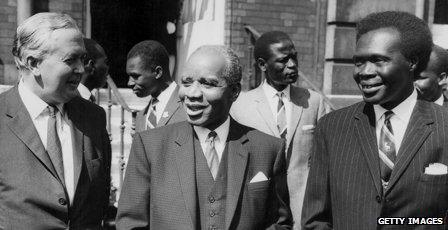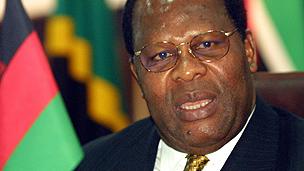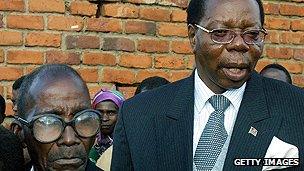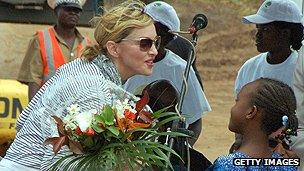Malawi profile
- Published
A chronology of key events:
1480 - Bantu tribes unite several smaller political states to form the Maravi Confederacy which at its height includes large parts of present-day Zambia and Mozambique plus the modern state of Malawi.

Dr Hastings Banda (centre) led Malawi from independence in 1963 until he fell ill in 1993.
17th century - Portuguese explorers arrive from the east coast of present-day Mozambique.
1790-1860 - Slave trade increases dramatically.
1850 - Scottish missionary David Livingstone's exploration of the region paves the way for missionaries, European adventurers, traders.
1878 - Livingstonia Central African Mission Company from Scotland begins work to develop a river route into Central Africa to enable trade.
1891 - Britain establishes the Nyasaland and District Protectorate.
1893 - Name is changed to the British Central African Protectorate. White European settlers are offered land for coffee plantations at very low prices. Tax incentives force Africans to work on these plantations for several months a year, often in difficult conditions.
1907 - British Central African Protectorate becomes Nyasaland.
1915 - Reverend John Chilembwe leads a revolt against British rule, killing the white managers of a particularly brutal estate and displaying the head of one outside his church. He is shot dead by police within days.
1944 - Nationalists establish the Nyasaland African Congress.
1953 23 October - Despite strong opposition from the Nyasaland African Congress and white liberal activists, Britain combines Nyasaland with the Federation of Northern and Southern Rhodesia (now Zambia and Zimbabwe respectively).
1958 - Dr Hastings Kamuzu Banda, "the black messiah", denounces the federation and returns from the US and the UK, where he has been studying, to lead the Nyasaland African Congress.
1959 - Violent clashes between the Congress supporters and the colonial authorities lead to the banning of the organisation. Many leaders, including Banda, are arrested and a state of emergency is declared.
Malawi Congress Party is founded as a successor to the Nyasaland African Congress.
1960 - Banda is released from Gwelo prison and attends talks in London with the British government on constitutional reform.
1961 - Elections held for a new Legislative Assembly. Banda's Malawi Congress Party wins 94% of the vote.
1963 - Territory is granted self-government as Nyasaland and Banda is appointed prime minister.
Independence
1964 6 July - Nyasaland declares independence as Malawi.
1966 6 July - Banda becomes president of the Republic of Malawi. The constitution establishes a one-party state. Opposition movements are suppressed and their leaders are detained. Foreign governments and organisations raise concerns about human rights.
1971 - Banda is voted president-for-life.
1975 - Lilongwe replaces Zomba as capital.
1978 - First elections since independence. All potential candidates must belong to the Malawi Congress Party and be approved by Banda. He excludes many of them by submitting them to an English test.
1980s - Several ministers and politicians are killed or charged with treason. Banda reshuffles his ministers regularly, preventing the emergence of a political rival.
1992 - Catholic bishops publicly condemn Banda, sparking demonstrations. Many donor countries suspend aid over Malawi's human rights record.
1993 - President Banda becomes seriously ill.
Voters in a referendum reject the one-party state, paving the way for members of parties other than the Malawi Congress Party to hold office.
Muluzi elected

Bakili Muluzi won elections and replaced long-term leader Hastings Banda
1994 - Presidential and municipal elections: Bakili Muluzi, leader of the United Democratic Front, is elected president. He immediately frees political prisoners and re-establishes freedom of speech.
Banda announces his retirement from politics.
1997 - Banda dies in hospital in South Africa where he is being treated for pneumonia.
1999 - President Muluzi is re-elected for a second and final five-year term.
2000 - World Bank says it will cancel 50% of Malawi's foreign debt.
2002 - Drought causes crops to fail across southern Africa. Government is accused of worsening crisis through mismanagement and corruption, including selling off national grain reserves before drought struck.
2002 September - Railway line linking central Malawi and Mozambican port of Nacala reopens after almost 20 years, giving access to Indian Ocean.
2004 May - Bingu wa Mutharika wins presidency.
Government says it will provide free anti-viral drugs to Aids sufferers.
2005 January - Three UDF officials are charged with treason after carrying guns to a meeting with President Mutharika. The president later pardons the trio.
Mutharika's struggles

President Mutharika, right, was elected to a second term but died in office
2005 February - President Mutharika resigns from the UDF over what he says is its hostility to his anti-corruption campaign. He forms the Democratic Progressive Party (DPP).
2005 June - President Mutharika survives an impeachment motion backed by the UDF. The speaker of parliament dies after collapsing during angry exchanges over the motion.
2005 November - Agriculture minister says five million people need food aid as Malawi bears the brunt of failed crops and a regional drought.
2006 April - Vice-President Cassim Chilumpha is arrested and charged with treason.
2006 July - Ex-president Bakili Muluzi is arrested on corruption charges.
2006 October - Controversy as American singer Madonna is given temporary rights to adopt a Malawian baby.

Pop star Madonna adopted two Malawian children
2007 May - Malawi begins exporting 400,000 tonnes of maize to Zimbabwe, after producing a surplus in 2006.
2008 January - Malawi ends diplomatic relations with Taiwan, switching allegiance to China.
2008 May - Several opposition figures and ex-security chiefs are arrested after President Mutharika accuses his predecessor, Bakili Muluzi, of plotting to depose him.
Mutharika re-elected
2009 May - President Mutharika wins second term in election.
2010 May - A gay couple is convicted and jailed for breaching anti-homosexuality laws, sparking international condemnation. The two men are given a presidential pardon and released.
2010 August - New national flag introduced amid controversy. First local elections in a decade postponed again.
2010 October - Diplomatic row with Mozambique over a new waterway connecting Malawi with the Mozambique coast. Mozambique impounds first barge to use new route.
2010 November - Protests against a bill setting the retirement age at between 55 and 60, higher than average life expectancy.
2011 March - President Mutharika angers opposition parties by calling on members of his Democratic Progressive Party at a rally to beat up those who have insulted him.
2011 May - Malawi expels British high commissioner over a leaked diplomatic cable in which the envoy describes President Mutharika as increasingly autocratic.
2011 July - Anti-government protests leave 19 people dead. Britain halts all aid to Malawi, accusing the government of mishandling the economy and failing to uphold human rights.
2012 April - President Mutharika dies, is succeeded by vice-president Joyce Banda. The following month she devalues the kwacha currency by a third to satisfy International Monetary Fund requirements to restore funding. This prompts panic buying of basic goods.
2012 October - Malawi asks the African Union to intervene in a border dispute with Tanzania over Lake Malawi, which is potentially rich in oil and gas. Malawi disputes Tanzania's claim to half the lake.
2013 October - President Banda sacks cabinet amid allegations of widespread corruption. Senior finance ministry official Paul Mphwiyo, an anti-corruption crusader, was shot and wounded in September.
2014 January - First of 70 defendants appear in court over the so-called Cashgate affair - the country's biggest corruption scandal so far.
2014 May - Peter Mutharika, the brother of late President Bingu wa Mutharika, wins presidential election.
2014 April - President Peter Mutharika signs into law raising the marrying age to 18, following a campaign against Malawi's's rate of child marriage - one of the world's highest.
2019 March - Cyclone Idai causes extensive flooding and loss of life in eastern districts.
2020 June - Christian preacher and theologian Lazarus Chakwera beats Peter Mutharika in a re-run of the 2019 presidential election, which the courts decided had seen widespread irregularities.